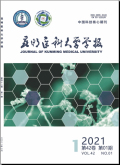昆明医科大学学报2024,Vol.45Issue(5):157-163,7.DOI:10.12259/j.issn.2095-610X.S20240524
基于脑血流动力学、炎性因子探究银杏叶注射液联合多奈哌齐治疗阿尔茨海默病的临床疗效
The Clinical Efficacy of Ginkgo Leaf Injection Combined with Donepezil in the Treatment of Alzheimer's Disease Based on Cerebral Hemodynamics and Inflammatory Factors
摘要
Abstract
Objective To explore the efficacy of combination therapy of Ginkgo biloba injection and donepezil in the treatment of Alzheimer's disease(AD)based on cerebral hemodynamics and inflammatory factors.Methods A total of 90 patients with AD in Zhangjiakou Shalingzi Hospital from March 2020 to January 2022 were randomly divided into a control group(45 cases)and a study group(45 cases).Both groups received the conventional symptomatic treatment.On this basis,the control group was given donepezil treatment,and the study group was given ginkgo leaf injection combined with donepezil treatment.The therapeutic effects,cerebral hemodynamic parameters[mean flow velocity(MFV)and pulsatility index(PI)of bilateral middle cerebral arteries(bilateral MCA)and basilar arteries(BA)],inflammatory factors[interleukin-6(IL-6),tumor necrosis factor-α(TNF-α),IL-1β],s100β protein,Aβ-amyloid 1-42(Aβ1-42),bradykinin(BK),cognitive function,activities of daily living,and adverse reactions were compared between the two groups.Results Com-pared with the control group(77.78%),the total effective rate of the study group(93.33%)was significantly improved(P<0.05);1,3,and 6 months after the treatment,the MFV of BA and bilateral MCA in the study group was higher than that in the control group,while the PI of BA and bilateral MCA was lower than that in the control group(P<0.05);The levels of serum TNF-α,IL-6,and IL-1β in the study group were lower than those in the control group 1,3,and 6 months after the treatment(P<0.05);1,3,and 6 months after the treatment,the levels of serum s100β protein,Aβ1-42,and BK in the study group were lower than those in the control group(P<0.05);1,3,and 6 months after the treatment,the score of the mini-mental state examination scale(MMSE)in the study group was higher than that in the control group,while the scores of the AD assessment subscale cognitive scale(ADAS-cog)and activities of daily living scale(ADL)were lower than those in the control group(P<0.05);The incidence of adverse reactions in the study group(13.33%)was not significantly different from that in the control group(8.89%)(P>0.05).Conclusion The efficacy of ginkgo biloba injection combined with donepezil in the treatment of AD is significant,which may be achieved by improving cerebral hemodynamics,downregulating inflammatory factors,and regulating the levels of serum s100β protein,Aβ1-42,and BK.关键词
阿尔茨海默病/银杏叶注射液/多奈哌齐/脑血流动力学/炎性因子Key words
Alzheimer's disease/Ginkgo biloba injection/Donepezil/Cerebral hemodynamics/Inflammatory factor分类
医药卫生引用本文复制引用
王亚敏,李媛媛,薛艳云..基于脑血流动力学、炎性因子探究银杏叶注射液联合多奈哌齐治疗阿尔茨海默病的临床疗效[J].昆明医科大学学报,2024,45(5):157-163,7.基金项目
张家口市重点研发计划基金资助项目(2221145D) (2221145D)

